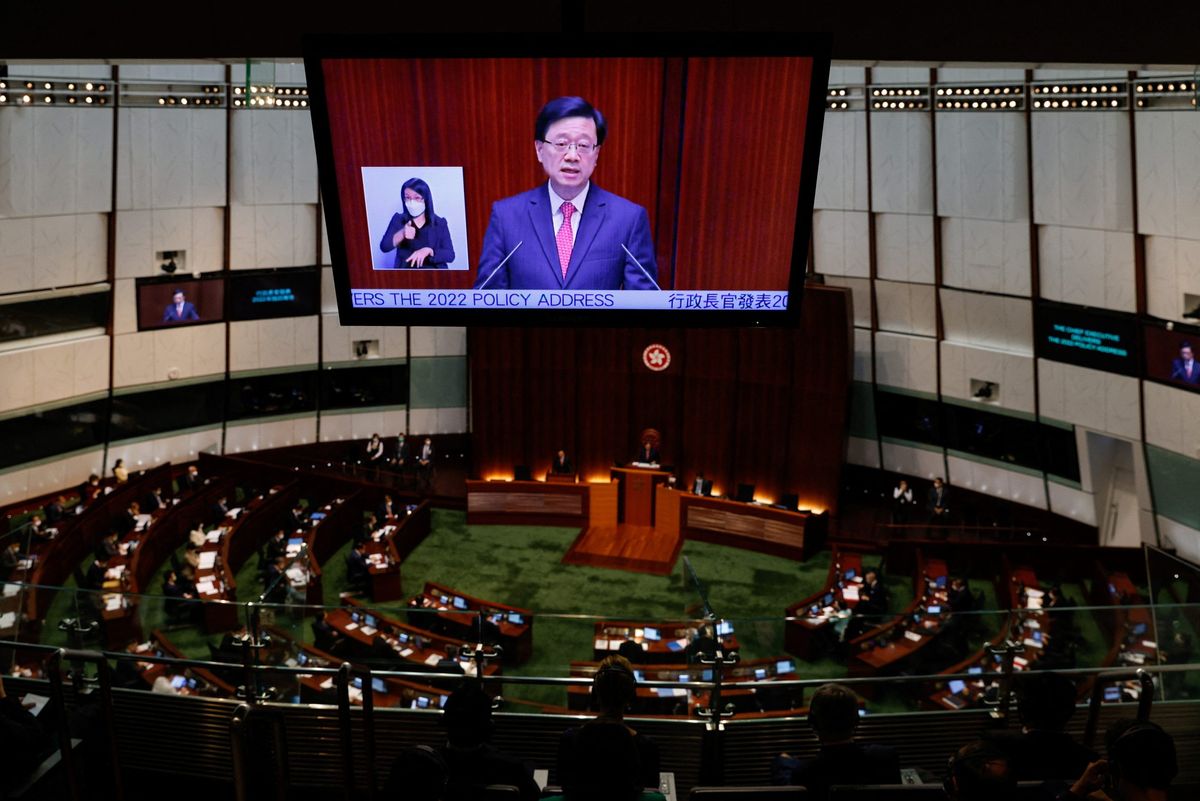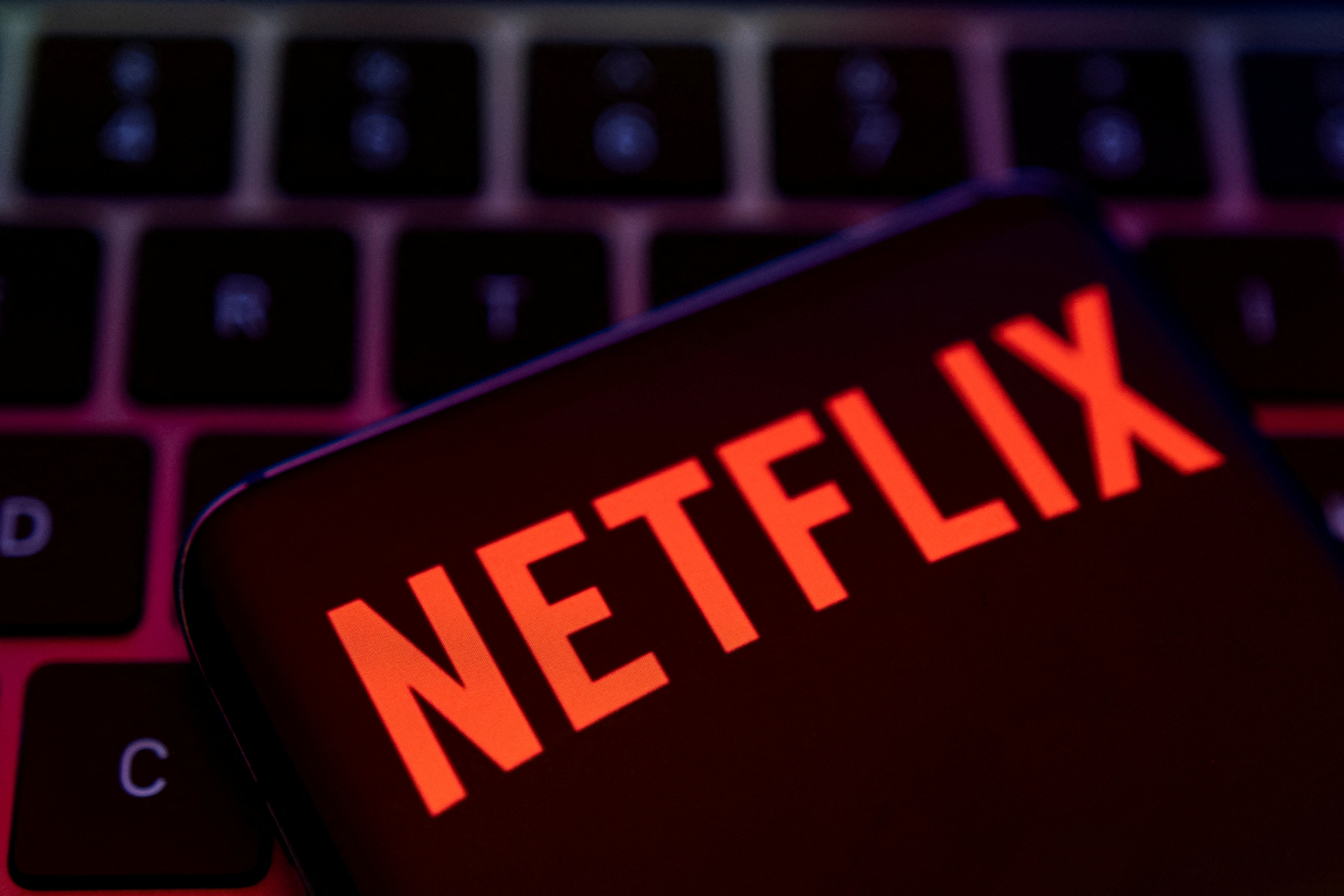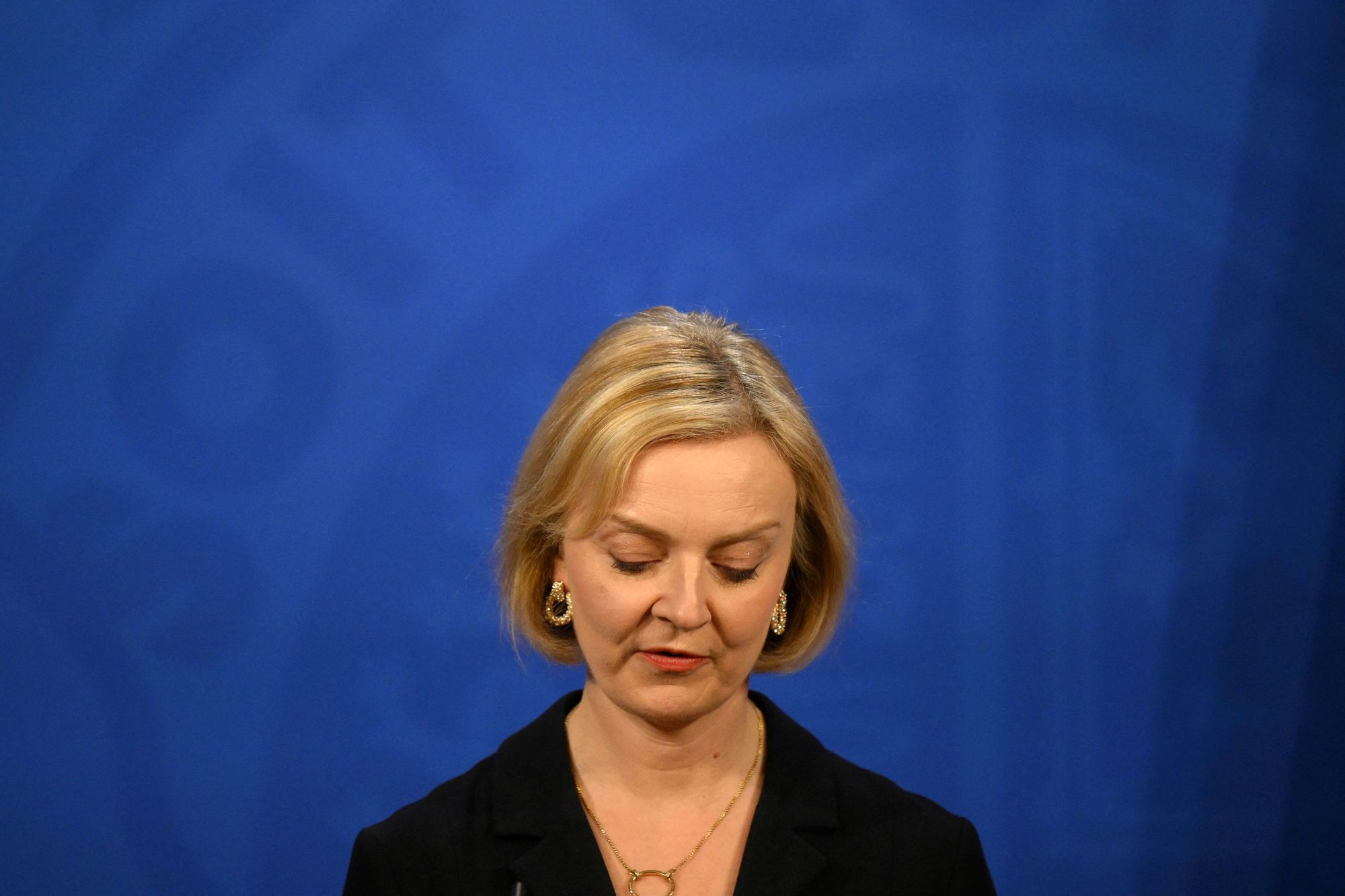From John Lee’s policy address to Netflix making a major comeback – Here’s your October 20 news briefing

A few minutes every morning is all you need.
Stay up to date on the world's Headlines and Human Stories. It's fun, it's factual, it's fluff-free.
To start off, we’re looking into:
John Lee’s CCP Congress address
This past July, John Lee became Hong Kong’s chief executive. Lee gave his first policy address as Hong Kong’s leader yesterday before the Legislative Council at the ongoing CCP Congress.
One of his major economic points was to emphasize Hong Kong’s need to “proactively trawl the world for talents” to stem the brain drain that’s drawn people away from the region since the beginning of COVID. To do this, Lee said he would cut property duties for non-permanent residents and relax visa rules, introducing a two-year pass for ambitious, talented and well-educated foreigners.
He also wants to make it easier for companies to list on the Hong Kong market. Plus, he’s interested in developing the tech industry in the city even more. To help stabilize the property market, he mentioned increasing the public housing supply. When it comes to COVID, Lee’s government is in conversation with the mainland about making travel between the two as easy and safe as possible.
Netflix is back on it

Netflix was the first major TV and film streamer out there, but it didn’t dominate the market for long. It seems like every media company is trying to create a streaming service – from Disney, NBC and HBO to Amazon Prime, Apple and Hulu … There are too many to name at this point. And Netflix’s numbers started to reflect the strain of competition. In the first half of this year alone, it lost 1.2 million customers.
But, in a surprise turn of events, Netflix has made a solid comeback over the past few months. It’s finally seeing growth again, with 2.4 million customers added in the third quarter. The company itself had projected less than half of that. After the results were released, the company’s shares skyrocketed 14% by the end of trading.
With that announcement comes bad news for some: Netflix will start majorly cracking down on password sharing in 2023.
Liz Truss has another bad day

About six weeks ago, Liz Truss became the Prime Minister of the UK, having won an election of about 200,000 conservative voters. She ran on a platform of cutting taxes for the rich, touting trickle-down economics as her justification. But when she went to implement the policy, UK markets weren’t happy, leading the BoE to roll out emergency interventions.
Well, now Truss is really dealing with a lot of political headwinds. She ended up firing her Chancellor of the Exchequer (basically the Treasury minister) over the weekend and had to appoint a new one to reverse the tax policies she ran her campaign on. And today, her home secretary resigned, leaving a brutal letter behind. There was also a kerfuffle in Parliament over a bill that some argued was a vote of confidence. More than 40 tories failed to back Truss in that vote.
She’s officially the least popular prime minister in the history of polling, with only a 10% approval rating. So now people are asking the big question – just six weeks into the role, is it time for Truss to resign?

Some notable speakers at this year’s Hong Kong FinTech Week include Adrian Cheng, CEO of Hong Kong’s New World Development; Harshika Patel, CEO of JP Morgan’s Hong Kong arm; Norman Chan, Chairman of RD Technologies; Yuval Rooz, CEO of Digital Asset; and Yat Sui, Co-founder and Executive Chairman of Animoca Brands.
With this, attendees can gain insight into the minds of brilliant industry pioneers, all of whom are expected to shed light on the current trends and the future of the bustling fintech sector.
Get your tickets today for 10% off.
To end, we’ll look into:
It’s not me, it’s you – what is The Great Breakup?
It’s not exactly a secret that women have a more difficult time climbing the ranks of big businesses than men. Globally, they hold only 23% of executive positions and only 29% of senior management positions. There are many reasons for this, from the “motherhood penalty” to downright sexism and unconscious biases in hiring and promotion processes. New research even shows that women who don’t get a senior job in the first 10 years of their career are far less likely to get one at all, while men’s chances accelerate after having kids.
And now, in a post-pandemic world where lots of people are leaving their jobs to look for somewhere they feel happier, women are engaging in what some have called The Great Breakup.
To be clear, this great venture isn’t exactly like The Great Resignation, which included plenty of people who left their jobs to pursue different careers altogether. Here, the focus is on women who leave their company to move to one that more closely shares their values.
A report by Lean In and McKinsey and Co. found that many women leave their jobs looking for roles that will help them prioritize their career advancement while also focusing on things like diversity, inclusion and flexibility. Flexibility is a big one, too; men support working primarily in the office at double the rates of women, and the working theory for that is that men aren’t dealing with childcare as much.
There’s some question as to whether or not these moves will pan out in the long run, though. The traditional model has always focused on people staying at a company for a long time and working up the ranks. For some of these women initiating the breakup, it might negatively affect their careers. Plus, it could perpetuate problems of inequality at existing companies since the candidate pool shrinks with every woman who leaves.
But it’s hard to blame anyone for leaving their job for one that makes them happier.
In other news …
📉Stocks: MSCI’s global gauge of stocks dipped 0.76%, hitting 2,439.30.
📰Some specifics:
- Dow Jones is down 0.33% to 30,423.81.
- Nasdaq Composite slipped 0.85% to 10,680.51.
- S&P 500 is down 0.67% to 3,695.16.
- Hang Seng Index is down 2.38% to 16,511.28.
🧠Some quick factors to bear in mind:
- A two-day market rally ended on Wednesday, with markets in the red, although averages are still up for the week. Cautious corporate outlooks and higher-than-expected inflation data from the UK have cooled investors’ risk appetite.
- In the US, earnings season is still going well, but the bond market has been looking kind of volatile. The benchmark Treasury yield is at its highest since 2008, suggesting there are still palpable recession fears lingering.
- Meanwhile, in Hong Kong, the Hang Seng dropped after John Lee’s Party congress speech. Although Lee proposed new economic stimulus measures, this didn’t quite boost sentiment, and investors remain cautious. Plus, President Xi said the country isn’t planning on scaling back its zero-COVID stance, keeping markets anxious.
- China’s delaying the release of several key economic reports has also weighed on investors, as well as rising tensions stemming from the US putting new tech curbs on exports to China.
👄Some comments and chatter:
- “If you keep things simple and say the 10-year Treasury is the risk-free rate that basically the majority of other asset classes in the world are priced off of … that is going to cause choppy markets across the board,” said Keith Lerner, co-CIO and chief market strategist at Truist Advisory Services.
- “Looking from a longer term, now is a good time to invest as valuations of mainland stocks are low,” said Wu Xuan, chief market analyst at Topsperity Fund.
🛢Oil: Crude oil prices went higher due to tighter supply. US crude rose 3.30% to US$85.55 per barrel, and Brent went to US$92.41 per barrel, up 2.64%.
👛Bitcoin: Bitcoin dropped 0.75% today, hitting US$19,184.30 at the time of writing.
👮♂️Putin declares martial law: In the four Russian-annexed regions of Ukraine, Putin has declared martial law. He also gave all regional governors across Russia emergency powers, allowing new restrictions throughout the country. According to Russian law, this could mean banning public gatherings, putting travel restrictions and curfews in place, censorship and other measures.
❗Iran sends drone trainers to Crimea: According to US officials, Iran sent trainers to occupied Ukraine to help Russia use the drones it purchased from Tehran, suggesting a growing closeness between Iran and Russia. The trainers are operating from a military base in Crimea.
📢Protests in France: Thousands of protesters have taken the streets all over France in a union-led nationwide strike for higher salaries. Protestors are demanding salaries that keep up with the soaring cost of living. The strikes are affecting transportation, education and public health sectors.
🌎Swedish government ends environment ministry: Sweden’s new right-wing government scrapped the Ministry of Environment. Instead of being a stand-alone department with its own minister, it will now be absorbed by another ministry. This move has caused a national outcry.
🥳Hong Kong COVID relaxations: In another push to revive its status as a global financial hub, Hong Kong will raise the cap of people allowed to gather in public from four to as many as 12 people starting October 20. Businesses continue to call for lifting the remaining restrictions. Meanwhile, Shanghai is building a COVID isolation facility that can house thousands near the center of the city, a move that suggests the zero-COVID policy isn’t going anywhere.
💻TSMC considers Japanese expansion: The computer chip manufacturer TSMC is reportedly considering an expansion in Japan. This move comes as US-China relations experience more tension, with the US limiting semiconductor exports to Chinese companies. Other tech companies are also looking to move production to places with less direct Chinese influence.
❌Meta Giphy deal blocked in the UK: The UK’s Competition and Markets Authority has demanded that Meta sell Giphy to “a suitable buyer,” saying the deal could lessen competition in the sector. This is the first time a global regulator has dismissed a completed deal by a major tech company.
⛽The US opens its oil reserves: To keep oil prices stable after OPEC+ decided to limit production, US President Biden has decided to release 15 million barrels of oil from the country’s strategic reserves to be delivered by December. The US strategic reserves now have the lowest amount of supplies since 1984.
🙌Russia-Ukraine prisoner swap: On Monday, a prisoner exchange between Russia and Ukraine allowed over 100 Ukrainian women to walk free. Many of them were captured during the Azovstal steelworks siege in Mariupol back in May.
😮Ye opens his mouth again: The family of George Floyd is suing Ye (Kanye West) for comments he made on a podcast about the man’s death, which was ruled a homicide. Ye instead suggested the man had died from Fentanyl use. The family plans to sue for US$250 million in damages.
⚽Messi branches out: Football bigshot Lionel Messi is launching a holding company to invest in sports, media and technology worldwide. The company plans to explore “stage agnostic” opportunities – for example, helping startups build football-tech companies or investing in teams.
🐝Buzz on the fuzz: In Massachusetts, a woman has been charged with assault and battery for releasing a swarm of bees on a group of deputies when they tried to serve her an eviction notice. She pleaded not guilty and was released without bail.

Written and put together by Jake Shropshire, Vanessa Wolosz, Christine Dulion and Krystal Lai




Comments ()